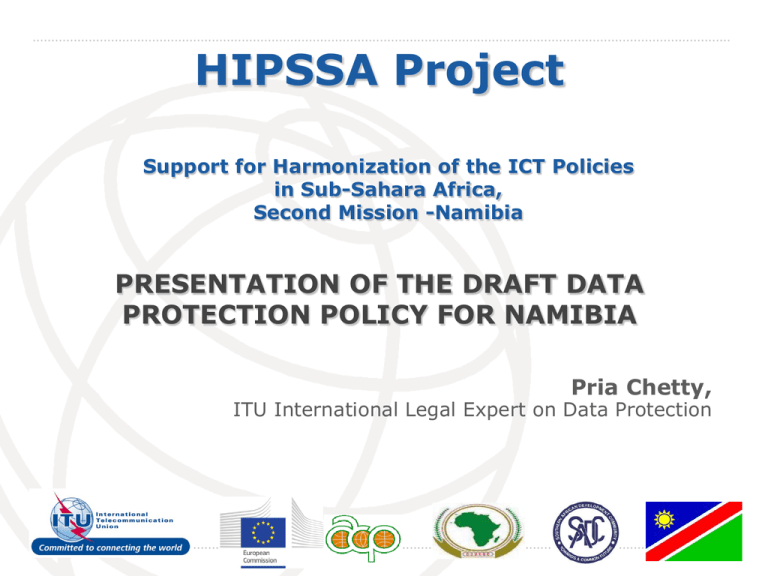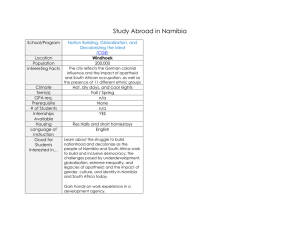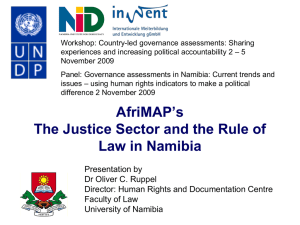HIPSSA Project PRESENTATION OF THE DRAFT DATA PROTECTION POLICY FOR NAMIBIA
advertisement

HIPSSA Project Support for Harmonization of the ICT Policies in Sub-Sahara Africa, Second Mission -Namibia PRESENTATION OF THE DRAFT DATA PROTECTION POLICY FOR NAMIBIA Pria Chetty, ITU International Legal Expert on Data Protection International Telecommunication Union INTRODUCTION International Telecommunication Union Introduction – Why adopt Data Protection Policy? Vast quantities of data to be transmitted within seconds across national frontiers, and indeed across continents, has made it necessary to consider privacy protection in relation to personal data. Privacy protection laws (or policy statements) have been introduced in several developed and developing countries to prevent violations of fundamental human rights, such as the unlawful storage of personal data, the storage of inaccurate personal data, or the abuse or unauthorised disclosure of such data. Disparities in national legislations could hamper the free flow of personal data across frontiers; countries considered it necessary to harmonise national privacy legislation and, upholding such human rights and prevent interruptions in international flows of data. Source: OECD Guidelines on the Protection of Privacy and Transborder Flows of Personal Data Introduction – Why adopt Data Protection Policy? Need to introduce at policy level - Data Protection Principles to ensure personal information is: used fairly and lawfully used for limited, specifically stated purposes used in a way that is adequate, relevant and not excessive accurate not retained for longer than is necessary handled according to privacy and data protection rights retained securely, with the integrity intact not transferred outside Namibia without adequate protection DRAFT DATA PROTECTION POLICY FOR NAMIBIA International Telecommunication Union Foreword to Policy The point of departure has been to facilitate the protection of personal data in Namibia by translating international principles of data protection into policy statements. By embracing principles of data protection, it is intended that Namibians will benefit through mitigation of abuses of personal data as well as from trade opportunities associated with internationally aligned data protection approaches. Foreword to Policy The Policy should be read in conjunction with the ICT Policy that is in line with national, regional, continental and global developments in the Information and Communications Technology (ICT) sector. The Namibian Government’s Vision 2030 document provides that ICT must be the most important sector in the economic development of the country by 2030. Core to the achievement of this Vision is a demand driven need to transform Namibia into a knowledge based economy where the exchange of data and personal data according to rules and principles of treatment will be critical. Foreword to Policy In addition, the increase in institutional capacity to develop, regulate and implement this policy is paramount. The proposed establishment of a Data Protection Authority (in line with international trends) is an important first step on this journey, but much work remains, particularly in understanding how this Authority will function and collaborate with similar structures in other areas of regulation. Finally, a proposed new Data Protection Bill will give effect to major aspects of this Policy. Definitions used in Policy Data controller or controller: refers to any natural person, legal person or public body which alone or jointly with others determines the purpose and means of processing of personal data. Where the purpose and means of processing are determined by or by virtue of an act, decree or ordinance, the controller is the natural person, legal person or public body has been designated as such by or by virtue of that act, decree or ordinance. Data subject: refers to any individual who is the subject of personal data processed and who is identified or identifiable. Personal data or personal information: refers any information relating to an identified or identifiable person;. Definitions used in Policy Processing or processing of personal data: refers to any operation or set of operations which is taken in regard to personal data, whether or not it occurs by automatic means and includes, the collection, recording, organisation, storage, adaptation, alteration, retrieval, gathering, use, disclosure by transmission, dissemination or otherwise making information available, alignment or combination, blocking, erasure or destruction of such data. Data Protection Authority or Authority: refers to an independent administrative authority responsible for ensuring that personal data is processed in compliance with the provisions of the data protection law enacted. Policy Goals The Government of Namibia in this Policy sets out policy statements: To “protect the fundamental rights and freedoms of natural persons, and in particular their right to privacy with respect to the processing of data. To protect Namibian citizens from abuse of their personal data. To promote harmonisation of Namibia’s data protection policy and legal frameworks with other regional and international jurisdictions, ensuring the free flow of personal data under conditions of assurance and trust Guiding Principles - Scope of Policy This Policy pertains to protection of personal data, in public or private sectors, which, because of the manner in which they are processed, or because of their nature or the context in which they are used, pose a danger to privacy and individual liberties. This Policy should not be interpreted as preventing: application, to different categories of personal data, of different protective measures depending upon their nature and the context in which they are collected, stored, processed or disseminated; or the exclusion of personal data which obviously does not contain any risk to privacy and individual liberties. Exceptions to Policy statements One and Two, including those relating to national sovereignty, national security and public policy, should be: as few as possible, and made known to the public. Policy Statements Title - Collection Limitation Policy statement - There should be limits to the collection of personal data and any such data should be obtained by lawful and fair means and, where appropriate, with the knowledge or consent of the data subject. Title - Data Quality Policy statement - Personal data should be relevant to the purposes for which they are to be used and, to the extent necessary for those purposes, should be accurate, complete and kept up-to-date. Policy Statements Title - Purpose Specification Policy statement - The purposes for which personal data are collected should be specified not later than at the time of data collection and the subsequent use limited to the fulfillment of those purposes or such others as are not incompatible with those purposes and as are specified on each occasion of change of purpose. Title - Use Limitation Policy statement - Personal data should not be disclosed, made available or otherwise used for purposes other than those specified in accordance with 6.3.3 except: with the consent of the data subject; or by the authority of law. Policy Statements Title - Security Safeguards Policy statement - Personal data should be protected by reasonable security safeguards against such risks as loss or unauthorised access, destruction, use, modification or disclosure of data. Title - Openness Policy statement - There should be a general policy of openness about developments, practices and policies with respect to personal data. Means should be readily available of establishing the existence and nature of personal data, and the main purposes of their use, as well as the identity and usual residence of the data controller. Policy Statements Title - Individual Participation Policy statement - An individual should have the right: • to obtain from a data controller, or otherwise, confirmation of whether or not the data controller has data relating to him; • to have communicated to him, data relating to him within a reasonable time; at a charge, if any, that is not excessive; in a reasonable manner; and in a form that is readily intelligible to him; • to be given reasons if a request made under subparagraphs(a) and (b) is denied, and to be able to challenge such denial; and • to challenge data relating to him and, if the challenge is successful to have the data erased, rectified, completed or amended. Policy Statements Title - Accountability Policy statement - A data controller should be accountable for complying with measures which give effect to the principles stated above. The principle of Accountability places an onus on the data controller to ensure that personal data is treated according to the policy and in time, the Data Protection Law. Cross Border Transfer of Personal Data Namibia shall take into consideration the implications of cross- border (transborder) transfer of personal data to countries for processing. Namibia shall promote that all reasonable and appropriate steps to ensure that transborder flows of personal data, are uninterrupted and secure. Namibia shall refrain from restricting transborder flows of personal data between itself and another country except where the latter does not yet substantially observe compatible protection of personal data in its domestic privacy legislation. Namibia shall avoid developing laws, policies and practices in the name of the protection of privacy and individual liberties, which would create obstacles to transborder flows of personal data that would exceed requirements for such protection. National Implementation Namibia shall establish legal, administrative or other procedures or institutions for the protection of privacy and individual liberties in respect of personal data. Namibia, in particular shall endeavour to: adopt appropriate legislation; encourage and support self-regulation, whether in the form of codes of conduct or otherwise; provide for reasonable means for individuals to exercise their rights; provide for adequate sanctions and remedies in case of failures to comply with legislated measures for the protection of personal data ; and ensure that there is no unfair discrimination against data subjects. International Cooperation Namibia shall, where requested, make known to other countries details of the observance of the principles of protection of personal data as set forth in policy statements. Member countries should also ensure that procedures for transborder flows of personal data and for the protection of privacy and individual liberties are simple and compatible with those of other SADC and AU regions and other international commitments. Namibia shall establish procedures to facilitate: information exchange with other countries in accordance with this Policy, and mutual assistance in the procedural and investigative matters involved. Namibia shall co-operate in regional and international objectives towards the development of principles, to govern the applicable standards in the case of transborder flows of personal data. Roles and Structures Role of Government The role of government is to promote effective policy and legislative framework for data protection in Namibia in order to render fair and equitable principles that balance the need for protection of personal data and interests of data subjects with the industry requirements for ease of exchange of personal data in the context of trade and economic growth and development. Role of the Data Protection Authority There shall be established a Data Protection Authority, being a juristic person and operates independently and is governed by a Board of Commissioners. The Board is appointed in accordance with the State Owned Enterprises Governance Act (2006). Beyond jurisdiction on the processing of personal data by public and private bodies, the Authority shall also provide for the regulation of marketing and automated transactional services in so far as the processing of personal data is concerned. Roles and Structures Roles of industry Assessing and aligning personal data collection, handling, distribution and other processing practices with policy and legislative frameworks for fair and lawful personal data processing. Role of data subjects Data subjects, as the identifiable subjects of personal data are required to understand their associated rights and the responsibilities of data controllers processing their personal data. Data subjects should in day to day terms in their dealings with data controllers require transparency and accountability regarding the processing of their personal data. Concluding Thoughts The Policy that will establish the mechanisms for protection of personal information in line with internationally accepted standards and principles of data protection. The establishment of a protection regime for personal data will only be effective with the creation of a Data Protection Authority in order to foster compliance with the law and protection of privacy. The fulfillment of ICT goals and an effective knowledge economy will rely on effective principles of data protection to build trust and assurance of minimum standards of personal information protection. THANK YOU Questions? Pria Chetty International Law Expert: Data Protection Samson N Muhapi National Law Expert: Data Protection



